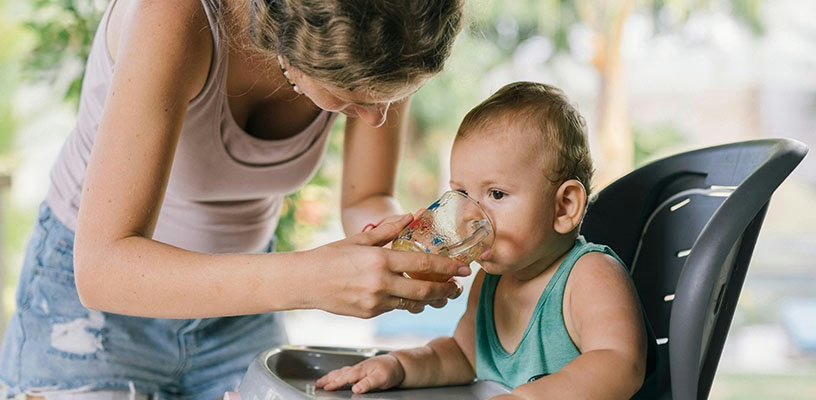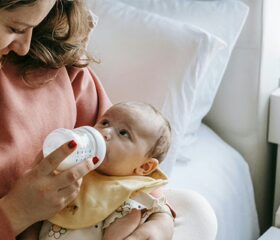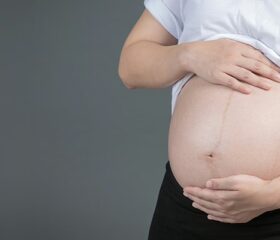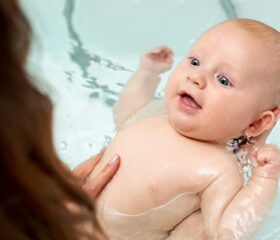When Can Babies Drink Water (And How Can You Safely Give It to Yours)?
Everybody needs water to survive, and your baby is no different. However, that doesn’t mean that you should give her water directly. As you might or might not know, doing that can be dangerous.

Why is that, and when, exactly, can you start giving your little one water to drink? Read on to find out.
Can you give your baby water?
Never give your baby water until she’s at least 6 months old.
It might seem counterintuitive, but babies get all the hydration they need from milk (whether it’s breast milk or formula milk). These liquids are balanced to support their growth and development, and there’s no need to give them extra water.
On that note, if you formula-feed your baby, always prepare the formula as directed. Don’t dilute it by adding extra water, even if you think your baby is thirsty.
Why shouldn’t you give your baby water?
Introducing water to your baby too early is dangerous because it can cause a chemical imbalance in her body. This causes a condition known as water intoxication.
How water intoxication works
Taking on too much water can dilute the levels of electrolytes (especially sodium) in your baby’s blood. This can lead to serious complications, such as seizures, brain damage, or a coma. It can even be fatal. 1
It’s important to be aware of the telltale signs of water intoxication. Common symptoms include:
- Irritability
- Drowsiness
- Nausea and vomiting
- Difficulty breathing
- Muscle cramps and twitching
Contact your healthcare provider immediately if you notice any of these symptoms.
Giving babies water can also lead to nutrient deficiencies
In infants more than 4 months old, drinking water can also reduce their appetite for breast milk or formula. Even once water intoxication is less of a concern, giving your baby water means she won’t get all the essential nutrients she needs. What’s more, breastfeeding too infrequently might also reduce your milk supply over time.
What if your baby drinks bathwater accidentally?
When you bathe your baby, it’s possible she’ll accidentally swallow some bathwater.
Swallowing a small amount is usually harmless, but you should still monitor her for signs of choking, or any of the symptoms of water intoxication we listed above.
If you see anything that concerns you, get her to the doctor right away.
When is it safe to give your baby water?
You can start offering your baby water around 6 months of age, once she begins eating solid foods. 2
At this stage, water can serve as a supplement (but not a replacement) for breast milk or formula, which should remain her primary source of hydration and nutrition until her first birthday (12 months old).
How much water is safe to give to your baby when she starts drinking?
The amount of water she needs depends on her age and developmental stage. You can use the table below as a guide:
How much water to give your baby
| 0–6 months | 6–12 months | 12–24 months |
|---|---|---|
| None | 4–8 oz per day | 8–12 oz per day |
The amounts in this table should be given in addition to milk or formula.
Note that most infants will self-limit when they drink water. Try offering it multiple times throughout the day. Expect your baby to take small sips, spit some of it out, and play with it in addition to just drinking it.
Other factors affecting how much your baby will drink
You can use the table above to get a rough idea of how much water is appropriate, but other factors influence how much water your baby needs, including:
- Weather: Hot weather means more sweating. She might need extra hydration to make up for the loss of fluid.
- Activity level: More active babies may lose fluids faster, particularly as they crawl and explore.
- Diet: By giving her water-rich food, such as watermelon, cucumbers, and zucchini, you can make sure she’s sufficiently hydrated.
- Health: If your baby is unwell with a fever, diarrhea, or vomiting, she’ll need additional fluids to make up for the water she loses.
Do breastfed babies need more water than babies who drink formula?
No, breast milk is more than 80% water, so it’s more than enough to meet your baby’s needs. 3 If she’s extra thirsty (e.g., on hot days), you can breastfeed her more, but if she isn’t old enough to drink water, don’t give her any.
How to start giving water to your baby safely
Once she’s old enough to start taking water, begin with just a few sips at meals and adjust as she grows and explores new foods.
Offering small amounts of water, around 1–2 ounces at a time (one eighth to a fourth of a cup), will also help her practice her drinking skills.
What type of cup to use
You can still use a baby bottle for formula or breast milk, but the best options for giving water to your baby are:
- Sippy cups
- Open cups
- Cups with a straw
Using these will help her develop her muscles and motor skills. Drinking from a cup will also teach her to become more independent.
Sippy cups are also popular, but pediatricians now recommend these less, as they’re associated with speech delay and future dental problems.
Is tap water safe for your baby?
Most tap water in the US is safe to drink, but some areas may have levels of lead or bacteria that are unsuitable for infants.
Tap water also contains fluoride. While fluoride helps prevent tooth decay, excessive amounts can lead to dental fluorosis, identified by faint white markings on your baby’s teeth. 4
If you’re unsure about your water source, consider testing it or consulting your local health department. You can also:
- Purify it: Use a water filter or purifier to ensure your tap water is safe for your baby.
- Boil it: Boiling tap water can also kill bacteria. Allow the water to cool to room temperature before offering it to her or using it to mix formula.
If your tap water isn’t safe or you prefer to use an alternative, choose low-fluoride bottled water.
Can babies drink sparkling or flavored water?
Stick to plain water when introducing it to your baby. Flavored waters often contain additives and sweeteners that aren’t suitable for infants, and as for plain sparkling water, it isn’t usually a good idea to give them carbonated drinks of any type.
How to make sure your baby isn’t dehydrated
Just like adults, babies can be prone to dehydration, especially in hot weather. It can be harder to tell if your baby is dehydrated, so it’s very important to know how to identify the symptoms.
The early signs of dehydration in infants include:
- Fewer wet diapers (less than six per day)
- Less full wet diapers
- Lack of tears when crying
- Dry lips and mouth
- A sunken soft spot on a baby’s head (known as a fontanelle)
More severe signs of dehydration include:
- Fever
- Lethargy or extreme fussiness
- Sunken eyes
- Cool, discolored hands or feet
Severe dehydration can progress quickly and may require urgent medical attention, so if you notice any of these signs, contact your pediatrician immediately.
Final thoughts
Again, as natural as it might seem to quench your baby’s thirst with water, be cautious. Remember, breast milk or formula can provide all the hydration and nutrition she needs.
Every baby is different, and if you have any questions or are concerned that yours isn’t getting enough hydration from the milk or formula you’re giving her, contact your healthcare provider.
Article Sources
- St. Louis Children's Hospital. "Water Intoxication in Infants" Retrieved July 21, 2025.
- National Health Service. "Drinks and cups for babies and young children" Retrieved July 21, 2025.
- World Health Organization. "Breastfeeding" Retrieved July 21, 2025.
- Centers for Disease Control and Prevention. "About Dental Fluorosis" Retrieved July 21, 2025.







